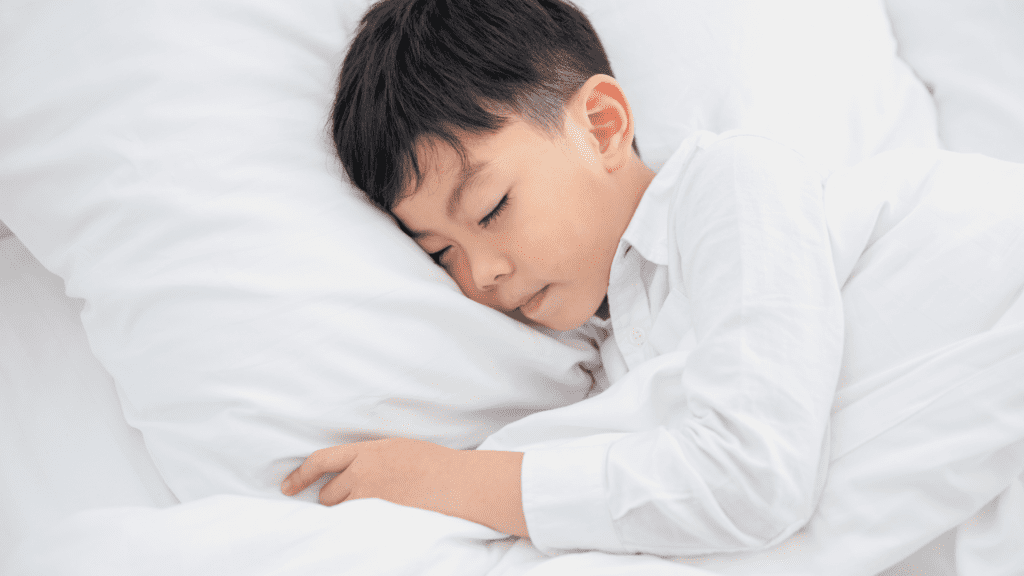Sleep is a crucial aspect of a child’s physical, cognitive, and emotional development, and it plays a vital role in their overall well-being. As school-going kids juggle academic demands, extracurricular activities, and social engagements, ensuring adequate sleep can be challenging for parents and children. Understanding the sleep needs of school-going kids can help parents and caregivers foster healthy sleep habits and support their children’s overall development.

Recommended Duration of Sleep
Sleep is essential to a child’s development, but figuring out the perfect amount of snooze time can be quite a puzzle. It’s not a one-size-fits-all solution, as every kid has unique needs. But, if you notice your child being irritable, unfocused, or moody during the day, it’s a clear sign that they may not be getting enough shut-eye. From age to lifestyle and environment, the quality of their bedding to how much light they are exposed to during daytime and at night, various factors affect the quality of sleep a child gets.
To give a general idea, a school-aged child may need anywhere from 8-10 hours of sleep, while teens require around 8-10 hours. So, if you want your little ones to be healthy, happy, and well-rested, keep an eye out for the signs and help them get the sleep they need!
Benefits of a Good Night’s Sleep
A magical night of rest can do wonders for kids. It’s like pressing the refresh button on their brains! They become sharp, alert, and capable of recalling things better. Not to mention, their creativity levels skyrocket. But wait, that’s not all. It also aids in keeping their weight under control and decreases the chances of health problems like diabetes or heart disease. A good night’s sleep is the key to unlocking a child’s full potential, both mentally and emotionally.
The Consequences of Inadequate Sleep
Insufficient sleep can have several adverse effects on school-going kids, including:
- Behavioral issues: Children who do not get enough sleep may exhibit irritability, mood swings, and aggression.
- Poor emotional regulation: Sleep-deprived kids might struggle to manage their emotions and may be more prone to anxiety and depression.
- Weakened immune system: Chronic sleep deprivation can weaken the immune system, making children more susceptible to illnesses and infections.
- Obesity risk: Inadequate sleep has been linked to a higher risk of obesity due to hormonal imbalances that affect appetite regulation.
Sleeping Tips to Ensure Children Get Enough Rest at Night
Getting enough sleep is essential for everyone, but it is vital for school-aged kids.
Parents should take the following steps to ensure their child gets enough sleep:
First, create an environment that promotes sleep by keeping the room dark, cool, and quiet. No more distractions like TVs or computers! And, let’s block out those pesky bright lights too.
Secondly, establish a bedtime routine that works for you and your child. Turn off electronics at least an hour before bedtime, read a story or listen to some soothing music together, and plan a special moment before saying goodnight. Maybe share a silly joke or snuggle up for a hug!
Lastly, encourage relaxation in your child’s daily routine. A warm bath, exercise, or a walk outside can help them unwind and feel ready for sleep. Remember, a well-rested child is a happy child – so let’s prioritize those zzz’s!
FAQs on sleep needs of School-Going Kids
How much sleep do school-going kids need?
What are the signs that my child is not getting enough sleep?
How does sleep affect my child’s academic performance?
How can I help my child get a good night’s sleep?
Can a consistent sleep schedule improve my child’s sleep?
What should I do if my child has trouble falling asleep?
What are the long-term consequences of sleep deprivation in school-going kids?
How can I create a bedtime routine that works for my child?
Are electronic devices harmful to my child’s sleep quality?
Can naps make up for lost sleep at night?
Conclusion
By understanding these five essential facts, parents can incorporate changes in their child’s lifestyle and routine to ensure that their child gets the sleep they need to thrive. Establishing a consistent sleep schedule, limiting electronic device use before bedtime, creating a sleep-conducive environment, and monitoring for sleep problems can significantly affect your child’s sleep habits and overall well-being.
Do check out our blog on Exercises to Keep Your Brain Sharp and Improve Memory Function










